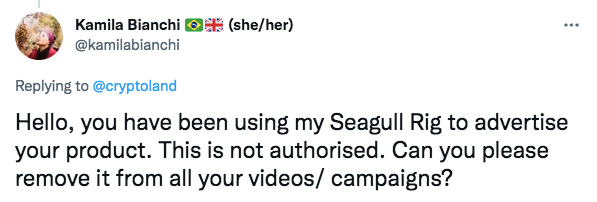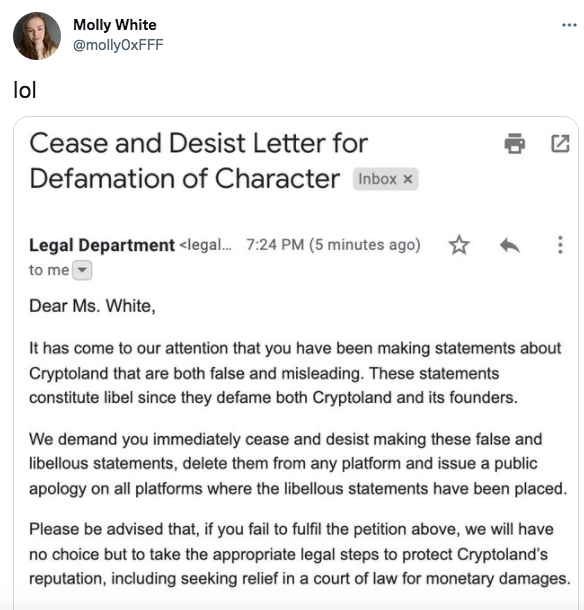Privacy and control over one’s data lie at the heart of the Web3 agenda. The next generation of internet should take data out of the hands of third parties and big corporations, giving individual users far more control over how it’s used. While this is true, there’s also an opposite force at work. The unregulated spread of information across Web3 makes censoring an opinion, news piece or even just gossip incredibly difficult. Nowhere is that more true than in the NFT space, where we can learn a lot about how Web3 will eventually function.
Cryptoland
Take the case of Cryptoland, one of the most famous PR debacles in NFT history. The project aims to build a crypto “utopia” on a private island in Vanuatu, with its ecosystem based entirely on NFTs and cryptocurrency. King Cryptolander NFTs (valued at $1 million) give owners physical land on the real life island. As Utopian as it sounds, Cryptoland has had a rough ride on social media, not least when it used a cartoon seagull in one of its promotional videos.

When the creator of that cartoon reached out to Cryptoland on Twitter claiming that she created it, was never consulted over its use and would like it to be removed, the company’s response was swift and simple: they blocked her. This act alone spawned countless Twitter threads and the news was widely shared, but Cryptoland continued to dig. When another user created a thread of alleged red flags related to the project, Cryptoland issued a cease and desist email, threatening to take her to court and seek financial remuneration if she didn’t keep her mouth closed.

That really set social media alight. The cease and desist was shared widely across Twitter, including on accounts like Keith Olbermann, who has more than one million followers. Cryptoland was condemned, mocked and became the subject of a whole host of memes and YouTube videos. The end result is quintessential Streisand Effect. Tens of thousands of people who hadn’t heard of Cryptoland were suddenly piling on the negative publicity. At best the noise is an unwelcome distraction for the company, at worst it’s done damage to their reputation that will be difficult to repair. Some are already calling it the NFT version of Fyre Festival.
Non Funglible Olive Garden
Cryptoland might be one of the more famous victims of the Streisand Effect (and most significant due to the amount of capital involved) but it’s far from the only one. Rarely does a day go by when a Twitter user doesn’t uncover dirt or questionable tactics from an NFT team and share them in an investigate thread. These threads are disseminated widely and news travel extremely fast. Olive Garden found this out to their cost when they tried to slap a DMCA on the NFT project NFOG (Non Fungible Olive Garden).
The idea behind NFOG is simple. Collectors mint a picture of an Olive Garden franchise, which they then “own.” Breadsticks and pasta plates are also up for minting. Since the project has no affiliation with Olive Garden, the company tried to silence it through legal means. Unsurprisingly, this caused interest in the previously low key collection to skyrocket. All 880 franchises are now “sold” and the Discord has nearly 1000 members. Sales volume reached over 80 ETH and even the price of the fictional breadstick currency has climbed (you can still mint a complementary breadstick for free, though).
What should Olive Garden have done in this situation? Ignoring the project might have made it quietly go away. Perhaps they might have embraced it as free publicity and a gateway into NFTs, crypto and the Metaverse. Whatever the solution, it’s further proof that trying to silence anything NFT related inevitably has the opposite effect. Stage 7 of NFOG's roadmap even hints at a hostile takeover, with funds from the project being used to buy out Olive Garden’s parent company. If this were to happen, everybody with an NFOG would then own a real life Olive Garden franchise.
CryptoPhunks
Derivative project CryptoPhunks rose in price and popularity after Larva Labs issued a takedown notice. The news spread so far that it sparked an ongoing debate over the nature of art, copyright, parody and ownership. Flurks (a project mired in controversy over alleged far right affiliations) exploded into the limelight when it was delisted from OpenSea and Rarible. Twitter users criticised the platforms for acting against the spirit of NFTs while the project leader used the controversy as free publicity, rebranding Flurks as illegal NFTs. If OpenSea and Rarible had set out to generate more publicity around Flurks, they couldn’t have done a better job.

The NFT space is littered with these stories of unintended effects and censorship gone wrong. Some of the crucial components of NFT operation, including widespread social media utilisation, Discord chats and community, make it incredibly difficult - in some cases nearly impossible - to suppress information. Given that many cryptocurrency proponents were attracted to the currencies because of their decentralised nature, the idea of any kind of censorship is a sensitive topic and something that they’ll always fight against.
There are plenty of upsides to this, of course. Potential rugs and scams are now identified much quicker and in some cases pulled before they even get a chance to mint. The NFT community grows more astute by the day and unscrupulous projects can no longer silence their detractors via blocks or kicking them from Discord. The consequences are much wider ranging than just that, though.
Defi, almost by definition, means fewer official monitoring bodies and overseers. Sceptics cite security concerns, but the NFT space shows that the opposite is true. The rapid spread of information, open nature of communication and the difficulty of suppressing facts make for a far safer online world. While some of the Streisand Effect examples are certainly amusing, they hint at a more profound truth: a totally self policing, transparent and open Web3 environment is within reach.


